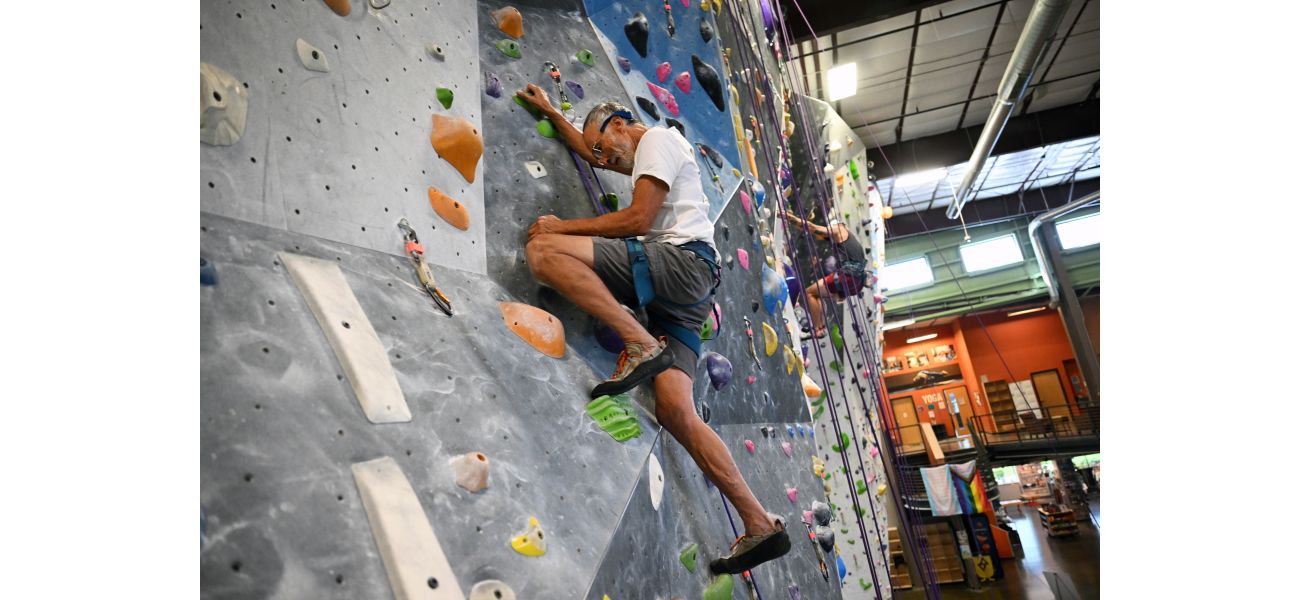A Colorado Parkinson's group uses climbing to combat the effects of the disease.
Exercise is a powerful tool for managing Parkinson's disease and increasing dopamine levels in individuals with low levels.
September 21st 2024.

For the past 12 years, Paul Stroud has been dedicated to finding ways to combat the effects of Parkinson's disease. He has tried various methods, from having stimulators implanted in his brain to taking medication and even attempting tai chi. However, it wasn't until recently that he discovered a form of therapy that has proven to be effective for him - rock climbing.
Every week, Stroud joins a group of individuals with Parkinson's at a local climbing gym in Golden. This group is part of a larger organization called Up Ending Parkinson's, which provides guided rock climbing for those living with the disease. Stroud, a 71-year-old Littleton resident, admits that he has never been a fan of heights, but the feeling of accomplishment he gets when he reaches the top of the wall makes it all worth it.
"At first, I wasn't too keen on the idea of climbing, but now I really enjoy it. It's challenging and rewarding," says Stroud. "I've noticed an improvement in my climbing abilities, and it's a great feeling to push myself and see how far I can go."
The man behind this climbing group is Doug Redosh, a 70-year-old Applewood resident who was diagnosed with Parkinson's about six years ago. As a former neurologist, Redosh has a deep understanding of the disease and has seen firsthand the struggles that his patients and even his own father have faced. With his love for climbing, Redosh saw an opportunity to combine his passion with his battle against Parkinson's.
"About 50 years ago, I started climbing and it's always been a big part of my life. When I came across an article about Up Ending Parkinson's in February, it was like a new lease on life for me," explains Redosh. "That inspired me to start this climbing program in Golden, and I have seen a significant improvement in my overall well-being since then."
The climbing group that Redosh started meets every Tuesday morning at the Movement climbing gym in Golden. They are a close-knit community, bonded by their shared experiences with Parkinson's. And while climbing may seem like an unconventional form of therapy, it has proven to be beneficial for these individuals.
"Rock climbing requires a lot of physical and mental strength, and it's a great way to challenge yourself and push your limits," says Redosh. "It's not just about reaching the top of the wall, but also about the journey and the sense of accomplishment that comes with it."
As more and more people are diagnosed with Parkinson's, organizations like Up Ending Parkinson's are providing much-needed support and resources for those living with the disease. For Stroud, being a part of this climbing group has not only improved his physical abilities, but it has also given him a sense of community and hope for the future.
"It's amazing to be a part of this group and see how far we have all come. We may have Parkinson's, but we are still capable of doing amazing things," says Stroud. "I am grateful for this opportunity to climb and to have the support of everyone here. It's a reminder that we are not alone in this fight."
Paul Stroud has been dealing with Parkinson's disease for 12 years and has tried many different methods to combat its effects. He's had brain stimulators implanted, takes medication, and even tried tai chi. But recently, the 71-year-old found a new form of therapy that has helped him in ways he never could have imagined - rock climbing.
At Movement gym in Golden, Stroud joins a weekly climbing session specifically designed for people with Parkinson's. This group is part of a larger organization called Up Ending Parkinsons, which provides guided rock climbing for those living with the disease. Stroud, along with other members of the group, have found that climbing has a unique ability to alleviate the symptoms of Parkinson's, particularly issues with balance and tremors.
Despite his fear of heights, Stroud has found climbing to be both fun and rewarding. He has steadily improved in his climbing abilities and has even challenged himself to try more difficult routes. For him, reaching the top of the wall is not only a physical accomplishment, but also a mental one. It gives him a sense of control over his disease and a feeling of doing something positive for himself.
The group in Golden was started by 70-year-old Doug Redosh, a former neurologist who was diagnosed with Parkinson's about six years ago. With his deep understanding of the disease and his passion for climbing, Redosh saw an opportunity to combine the two and create a unique form of therapy. He was inspired by an article he read about Up Ending Parkinsons and decided to start a climbing program in Golden. Since increasing his frequency of climbing, Redosh has noticed a significant improvement in his overall well-being.
The group in Golden meets every Tuesday morning and is a place for individuals with Parkinson's to come together and support each other. They share a common bond and are able to relate to one another's struggles. For Redosh, it's a way to give back and help others who are going through what he has experienced.
Climbing is not only physically challenging, but it also requires a great deal of mental focus and determination. For those with Parkinson's, it can be a way to take back control of their bodies and feel a sense of accomplishment. And for the members of this group in Golden, it's a reminder that they are capable of overcoming any obstacle, even one as daunting as Parkinson's disease.
Every week, Stroud joins a group of individuals with Parkinson's at a local climbing gym in Golden. This group is part of a larger organization called Up Ending Parkinson's, which provides guided rock climbing for those living with the disease. Stroud, a 71-year-old Littleton resident, admits that he has never been a fan of heights, but the feeling of accomplishment he gets when he reaches the top of the wall makes it all worth it.
"At first, I wasn't too keen on the idea of climbing, but now I really enjoy it. It's challenging and rewarding," says Stroud. "I've noticed an improvement in my climbing abilities, and it's a great feeling to push myself and see how far I can go."
The man behind this climbing group is Doug Redosh, a 70-year-old Applewood resident who was diagnosed with Parkinson's about six years ago. As a former neurologist, Redosh has a deep understanding of the disease and has seen firsthand the struggles that his patients and even his own father have faced. With his love for climbing, Redosh saw an opportunity to combine his passion with his battle against Parkinson's.
"About 50 years ago, I started climbing and it's always been a big part of my life. When I came across an article about Up Ending Parkinson's in February, it was like a new lease on life for me," explains Redosh. "That inspired me to start this climbing program in Golden, and I have seen a significant improvement in my overall well-being since then."
The climbing group that Redosh started meets every Tuesday morning at the Movement climbing gym in Golden. They are a close-knit community, bonded by their shared experiences with Parkinson's. And while climbing may seem like an unconventional form of therapy, it has proven to be beneficial for these individuals.
"Rock climbing requires a lot of physical and mental strength, and it's a great way to challenge yourself and push your limits," says Redosh. "It's not just about reaching the top of the wall, but also about the journey and the sense of accomplishment that comes with it."
As more and more people are diagnosed with Parkinson's, organizations like Up Ending Parkinson's are providing much-needed support and resources for those living with the disease. For Stroud, being a part of this climbing group has not only improved his physical abilities, but it has also given him a sense of community and hope for the future.
"It's amazing to be a part of this group and see how far we have all come. We may have Parkinson's, but we are still capable of doing amazing things," says Stroud. "I am grateful for this opportunity to climb and to have the support of everyone here. It's a reminder that we are not alone in this fight."
Paul Stroud has been dealing with Parkinson's disease for 12 years and has tried many different methods to combat its effects. He's had brain stimulators implanted, takes medication, and even tried tai chi. But recently, the 71-year-old found a new form of therapy that has helped him in ways he never could have imagined - rock climbing.
At Movement gym in Golden, Stroud joins a weekly climbing session specifically designed for people with Parkinson's. This group is part of a larger organization called Up Ending Parkinsons, which provides guided rock climbing for those living with the disease. Stroud, along with other members of the group, have found that climbing has a unique ability to alleviate the symptoms of Parkinson's, particularly issues with balance and tremors.
Despite his fear of heights, Stroud has found climbing to be both fun and rewarding. He has steadily improved in his climbing abilities and has even challenged himself to try more difficult routes. For him, reaching the top of the wall is not only a physical accomplishment, but also a mental one. It gives him a sense of control over his disease and a feeling of doing something positive for himself.
The group in Golden was started by 70-year-old Doug Redosh, a former neurologist who was diagnosed with Parkinson's about six years ago. With his deep understanding of the disease and his passion for climbing, Redosh saw an opportunity to combine the two and create a unique form of therapy. He was inspired by an article he read about Up Ending Parkinsons and decided to start a climbing program in Golden. Since increasing his frequency of climbing, Redosh has noticed a significant improvement in his overall well-being.
The group in Golden meets every Tuesday morning and is a place for individuals with Parkinson's to come together and support each other. They share a common bond and are able to relate to one another's struggles. For Redosh, it's a way to give back and help others who are going through what he has experienced.
Climbing is not only physically challenging, but it also requires a great deal of mental focus and determination. For those with Parkinson's, it can be a way to take back control of their bodies and feel a sense of accomplishment. And for the members of this group in Golden, it's a reminder that they are capable of overcoming any obstacle, even one as daunting as Parkinson's disease.
[This article has been trending online recently and has been generated with AI. Your feed is customized.]
[Generative AI is experimental.]
0
0
Submit Comment





